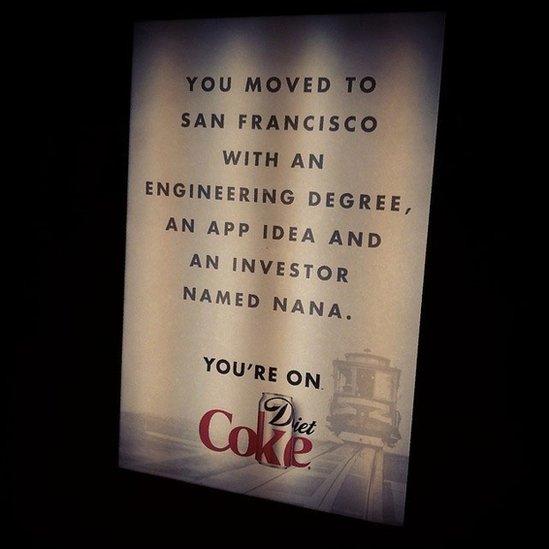A rather predictable but accidental drug reference
- Published

Coca-Cola's latest advertising campaign has been mocked for a presumably inadvertent reference to drug use. Where does it sit in the pantheon of accidently funny ad slogans, asks Lucy Townsend.
It features the words "you're on", followed closely by the Diet Coke logo.
You're on. Coke. Easily mistaken for - You're on coke. Coke being the shortened term for cocaine.
The campaign, on billboards and bus stops in San Francisco and New York, has been widely tweeted and written about. David Roth tweeted - "This is real. Coca Cola's new slogan really seems to be 'You're On Coke., external'" The Gothamist blog questioned a campaign that unsubtly nods toward cocaine addiction, external, and in industry magazine AdWeek David Gianatasio asks What has Diet Coke been snorting?, external
If cocaine is shortened to coke, and Coca Cola is shortened to coke, shouldn't inadvertent drug references be the first thing advertising agencies check for? "It would be interesting to know what was discussed when they planned this campaign," says Ben Bold, of Marketing Magazine. "Was it a mistake? Who knows. They would certainly not want any link to drugs, but then there's the whole no publicity is bad publicity thing."
Sometimes it's impossible to gauge the deliberateness of the innuendo. Context is everything. "Nothing sucks like an Electrolux" was used by the Scandinavian vacuum cleaner manufacturer for many years in the UK without mirth. But despite never being used in America - where "sucks" means "really bad" - it has been widely mocked.
Other advertising gaffes are caused by words lost in translation. KFC's "Finger lickin' good" has always been mocked for a translation into Chinese that came out as "KFC eat your fingers off". And when Pepsi entered the Chinese market the translation of their slogan "Pepsi Brings you Back to Life" supposedly came out as "Pepsi Brings Your Ancestors Back from the Grave". But such episodes, and those like the latest Coke posters, generate free publicity.
"Is it a disaster for them? Not really," says Bold. "It's on Twitter and Facebook, it's being talked about and written about." For the record, Coca-Cola denies ever making deliberate drug references. "The Diet Coke logo is the centrepiece of the ad campaign. Diet Coke in no way endorses or supports the use of any illegal substance," it said in a statement.
Follow @BBCNewsMagazine, external on Twitter and on Facebook, external